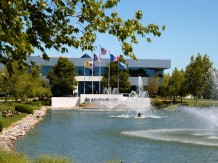Oosterhout, October 2015
- In 2013 Q.I. Press Controls installed 124 mRC-3D cameras at the The Columbus Dispatch’s printing plant. Two years ago, as part of a face-lifting exercise, The Columbus Dispatch decided to adapt its printing presses to enable them to print in 3V format. The aim was to bring machinery into line with ongoing quality and efficiency improvements being implemented by the business. At the time, The Columbus Dispatch was the first in the US to introduce the mRC-3D from Q.I. Press Controls. Now, two years on, the system is operating at full capacity, is living up to the expectations of The Columbus Dispatch, has led to significant savings in cost and waste, and – not least – gives Q.I. Press Controls yet another reason to take pride in its automated solutions.
124 mRC-3D cameras meet the requirements of The Columbus Dispatch’s editorial model in full
The Columbus Dispatch is responsible for bringing news, sport and entertainment to the citizens of Columbus, Ohio (USA). Whether its citizens are at home or on the move, The Columbus Dispatch keeps them informed of what’s happening in Central Ohio in the most efficient way allowed by the current technology. The Columbus Dispatch has a newspaper which goes by the same name, plus several other titles and an online platform. It was in 1871 that ten master printers decided it was time the city should have its own evening paper. The first ever edition of what was then called The Daily Dispatch was published on 1 July 1871. In the turbulent years in between, The Columbus Dispatch has become the most prominent newspaper in the region and since 1985 has been the only major daily in Columbus.

Kelly Cline, Production General Manager at The Columbus Dispatch
Kelly Cline, Production General Manager of The Columbus Dispatch, explains the organisation’s focus: “The overarching objective is the continuous improvement of our product for our readers. Our aims are to minimise waste and to continue improving print quality so that our operators can devote their attention to other aspects of optimising production.” In 2013, this focus led to a completely new editorial model and advertising strategy. The organisation decided to fit out its four TKS newspaper printing presses for a more compact layout, otherwise known as the 3V format. This is 40% smaller than the original format. The organisation added four new folders to the presses so that it was possible to fold and cut the newspaper length three times per overall cylinder circumference, instead of twice. This modification resulted in 24 pages of print, rather than 16, per overall cylinder rotation. The presses were converted in such a way that they were able to print both the normal format as well as the 3V. These modifications resulted in an increase in printing capacity.
As part of these ongoing developments, The Columbus Dispatch also went in search solutions for automatic colour and cut-off register. First and foremost, it was necessary for these systems to work with the 3V format, and secondly, for waste and start-up times to be reduced as much as possible. Last but not least, increased and error-free print quality through an improved and consistent register was a precondition. Personnel at The Columbus Dispatch were already acquainted with suppliers of register systems, amongst them Q.I. Press Controls. After some thorough research, Q.I. Press Controls was singled out for the installation of its colour and cut-off register on the presses. Kelly Cline explains the decision: “Q.I. Press Controls’ system was picked for its ease-of-use, its reputation and the self-cleaning lenses on the cameras. During a fact-finding mission to a plant that had also been fitted with a similar Q.I. Press Controls’ system, it soon became clear that they were extremely satisfied. This was a great help in arriving at our decision.”
In July 2013, The Columbus Dispatch placed a large order with Q.I. Press Controls for the supply, installation and operationalisation of 124 mRC-3D cameras for colour and cut-off control. The cameras come with optional AIMS (Automatic Ink Mist Shield) and Side-lay ribbon control. Unique to this system is the functionality of pre-setting the cut-off compensators. When a print run is loaded, all compensators are programmed to minimise waste. The engineers installed the cameras on four TKS newspaper printing presses with a total of 20 towers and four folders. It proved possible to implement this large project whilst normal newspaper production continued. For Q.I. Press Controls this represents an important order, not just in terms of size, but also because this is the first customer who has placed an order for the mRC-3D in the United States.
 The Columbus Dispatch building
The Columbus Dispatch building
Both The Columbus Dispatch and Q.I. Press Controls can look back with satisfaction at the collaboration during this complicated installation phase. “Q.I. Press Controls was a genuine partner during the installation,” explains Kelly Cline. The complicated installation procedure threw up some unexpected surprises. “The cooperation with the engineers and management at The Columbus Dispatch went very smoothly. The engineers provided fast and professional support and the contact with management was close and result-oriented. This meant that it was possible to identify and solve problems quickly at an early stage,” adds Ronald Reedijk, Managing Director of QIPC – EAE Americas.
The system reduces waste, saves time and ensures customer satisfaction and development.
The mRC-3D has currently been in use at The Columbus Dispatch for two years. Kelly Cline explains: “The system meets all our expectations and we believe we will see yet more results in the future. In our opinion, the system will continue to make savings in terms of both waste and time.” For Kelly Cline, it’s difficult to say at the moment how much money the system will have saved and contributed to reductions in waste. Because of the installation of the 3V technology, many projects took place simultaneously at The Columbus Dispatch, as well as several training programmes. “We have been able to cut down on our production costs and waste thanks to all these modifications,” adds Kelly Cline. Nevertheless, the system has been a key player in the economy drive. He explains: “One thing I can say with certainty is that the mRC-3D played a key part in our ongoing efforts, not least because it saves on time and money.”
The mRC-3D has had two other knock-on effects at The Columbus Dispatch. Customer satisfaction has increased significantly. They are very happy with the quality of the product and the fast switch-over times that the system facilitates. In the printers view the system is so convenient and the presses are a lot easier to manage, allowing them to work even more effectively. “The system meets all the criteria set down in the contract,” explains Kelly Cline, “and a lot more.”
An investment in the Q.I. Press Controls’ systems pays quick dividends.
Successful installation has once again delivered Q.I. Press Controls another satisfied customer. Reedijk is extremely pleased about the installation at The Columbus Dispatch: “At Q.I. Press Controls, everyone takes great pride in the confidence shown in our automated systems. This confidence has reaped its rewards in this key order.” Ronald Reedijk explains that Q.I. Press Controls systems have demonstrated their ability to play a decisive role in the printing process. The references confirm that the automated solutions provided by Q.I. Press Controls improve printing facilities both in terms of quality and efficiency. This results in costs savings for the printing industry. Even after operationalisation of the system, Q.I. Press Controls is on hand to carry out maintenance and to provide additional services should the customer experience any problems. Ronald Reedijk concludes: “An investment in the Q.I. Press Controls’ systems pays quick dividends. We are at your service. The Columbus Dispatch is now reaping the rewards.”
Click here to download the pdf